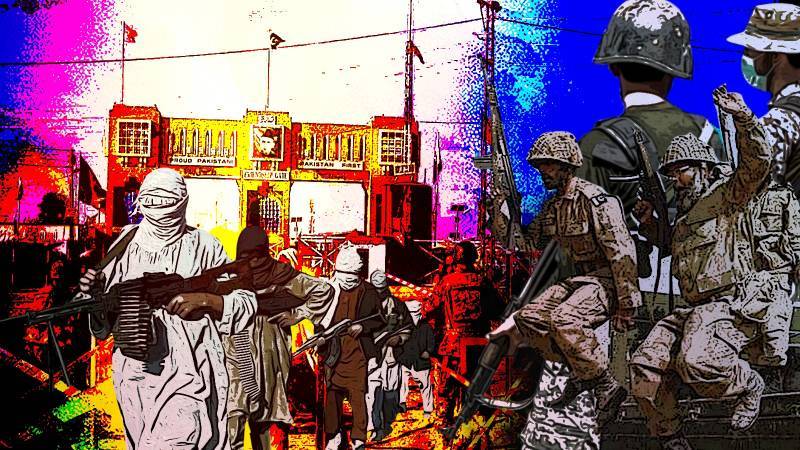
The title of this article might seem odd and irrelevant at first, but as you delve deeper, you will see that certain indicators within our country suggest otherwise. To relate this title to our current situation, let me first take you back in history and highlight key events that plunged post-World War I Germany into a political crisis, eventually leading to the rise of Adolf Hitler.
Following Germany's defeat and Kaiser Wilhelm II's abdication in 1918, the Weimar Republic was established but faced severe challenges: social unrest, economic turmoil, and war disillusionment. The deeply unpopular Treaty of Versailles imposed harsh penalties on Germany, undermining the Weimar government. Hyperinflation in 1923 and the global economic crisis of 1929 further destabilised Germany, with soaring unemployment and a struggling economy.
The Weimar Republic's political instability and ineffective responses to these crises created fertile ground for extremist movements. The Nazi Party, led by Hitler, capitalised on these conditions. Despite a failed coup attempt in 1923 and imprisonment, Hitler gained national attention and used the Treaty of Versailles to denounce the Weimar government. By 1933, the Nazi Party had mustered 43.9% of the popular vote, marking the end of the Weimar Republic and the beginning of Hitler's totalitarian Reich.
After establishing one-party rule in Germany, Hitler pursued expansionist policies. In March 1936, he violated the Treaty of Versailles by sending German troops into the demilitarised Rhineland. In March 1938, Germany annexed Austria in the Anschluss. In September 1938, Hitler annexed the Sudetenland through the Munich Agreement, promising no further territorial expansion. However, in March 1939, he violated this agreement by occupying Czech territories, and six months later, Germany invaded Poland, triggering World War II.
During these years of German expansion, the United Kingdom and other European countries avoided confronting Germany's aggression through appeasement policies, justifying these actions as a response to the harsh treatment from the Treaty of Versailles. Many European countries, particularly the UK, also viewed Nazi Germany as a bulwark against the spread of communism from the Soviet Union.
In September 1936, former British Prime Minister Lloyd George visited Germany and, after meeting with Hitler, wrote in the Daily Express that Germany did not pose a threat to Britain and did not want conflict with the UK. Later, Neville Chamberlain, British Prime Minister from 1937 to 1940, adopted a similar stance. The Munich Agreement of 1938, facilitated by Chamberlain and other European leaders, allowed Hitler to annex the Sudetenland. Chamberlain famously declared it as "peace for our time," believing it had averted war.
These policies of miscalculation by European leaders encouraged a fascist and ruthless dictator to pursue aggression and persecution of minority communities. How these policies encouraged Hitler's expansion and persecution is well-known in history, which I won't explore further. I now fast forward to the present to correlate these historical events with those evolving in our country today.
Pakistan is currently facing an economic crisis reminiscent of Germany in the 1920s. It is characterised by hyperinflation and a substantial foreign debt servicing burden that consumes nearly half of the annual budget. Another significant portion of the budget is allocated to defense spending, leaving minimal resources for development and public administration. The unemployment rate is high, and nearly 40% of the population is estimated to be living below the poverty line.
While it took the army more than two decades to realise that the Afghan Taliban and TTP are two sides of the same coin, the PTI seems to be still adhering to its old stance on terrorism
Politically, a fragile coalition government is in power. The leader of the opposition party, Pakistan Tehreek-e-Insaf (PTI), which claims to be the largest political party, is facing treason charges. Despite being in confinement, he continues to lead his party and persistently criticises the government and other key institutions of the country.
The external security situation of Pakistan is highly volatile, marked by tense relationships with its neighbours, India and Afghanistan. Afghanistan, by harbouring and supporting militants of the Tehreek-e-Taliban Pakistan (TTP), poses a significant threat to Pakistan, reminiscent of the threat Germany once posed to Britain and other European countries during Hitler's era.
In response to this threat, the Pakistani government has decided to launch Operation Azm-e-Istehkam. This decision faced immediate rejection from several political and religious parties, most notably the PTI, Jamaat-e-Islami (JI) and Jamiat Ulema-e-Islam (JUI-F). To build consensus among all stakeholders, Prime Minister Shehbaz Sharif proposed calling an All Party Conference, which received positive responses from various political parties, including the PTI. However, during the 265th Corps Commanders' Conference, the Chief of the Army took serious note of unwarranted digital criticism and the deliberate misrepresentation of the military's vision for vested interests.
A day after the Corps Commanders' Conference, a PTI spokesperson responded to the Army Chief's statement, expressing concern that criminalising freedom of speech would "open the door to using extra-legal measures against critics." The spokesperson emphasised the necessity for institutions to be receptive to criticism from both the public and political parties, stating that such openness is "indispensable" for resolving the country's crises. The PTI representative also emphasised that no army in the world can succeed against any challenge without the nation's support.
Shortly after calling for national support for the operation, PTI issued another statement emphasising the critical need for Pakistan to strengthen its ties with Afghanistan to effectively combat the Tehreek-e-Taliban Pakistan (TTP). While it took the army more than two decades to realise that the Afghan Taliban and TTP are two sides of the same coin, the PTI seems to be still adhering to its old stance on terrorism.
In the last quarter of 2022, when the people of Swat began protesting the return of TTP militants to the area, Barrister Saif of the PTI offered an explanation: "Anti-TTP groups are making the situation worse in K-P… things are right with Tehreek-e-Taliban Pakistan; they are not involved in target killing and extortion." The Pakistan Army also downplayed these claims of the people, with the Inter-Services Public Relations (ISPR) stating, "During the past few days, a misperception about the alleged presence of a large number of proscribed organisation TTP's armed members in Swat Valley has been created on social media."
Barrister Saif also boldly added to his statement, asserting that even if 2,000 armed individuals had entered the province, the government had the will and the resources to fight back. "We have tanks, guns, and fighter jets… a few thousand Kalashnikovs cannot stop the government. Only 40 to 50 people came to Swat with ordinary rifles."
A month later, families began fleeing from several areas of the Tirah Valley in Khyber district, gripped by fear after reportedly spotting militants, according to local officials. Speaking on condition of anonymity, the officials stated that families from Sanda Pal, Jarrhobi, Dwa Khulay, Baghrai, Khapur, and Dray Naghari either relocated to the adjacent Orakzai tribal district or sought refuge with relatives and friends in Dars Jumaat, Sherkhel, and Mergutkhel areas of Akkakhel. They added that these people, belonging to the Kamarkhel, Akkakhel, Zakhakhel, and Sipah tribes, had recently returned to the valley after a decade of displacement.
Since the Taliban's takeover of Afghanistan, Pakistan has pursued a policy of appeasement, resulting in a persistent rise in militancy. This approach has led to the regrouping and alliance of various militant and insurgent groups, united by a common objective: to weaken the country's security apparatus. These groups have created fear among the general population and intimidated government officials and politicians through destructive sabotage activities and kidnapping for ransom.
A well-equipped militant force, with safe sanctuaries in a neighbouring country and supporters within Pakistan, is unlikely to miss such an opportunity to achieve its goals
Since 2021, Pakistan has witnessed a sharp increase in fatalities from terrorist and insurgent attacks. By the end of 2023, there was nearly a 140% escalation, with fatalities rising from 412 in 2020 to 985 in 2023. This year, by the end of June 2024, Pakistan had lost 516 people to such attacks. If this trend continues, the number of fatalities could exceed 1,000 by the year's end (see Graph 1).
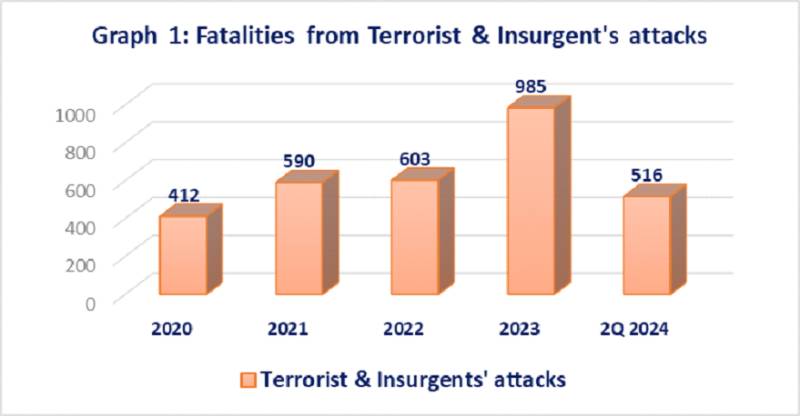
Khyber Pukhtunkhwa (KP) and Balochistan remained highly affected from militancy during this period as reflected in the Graph 02.
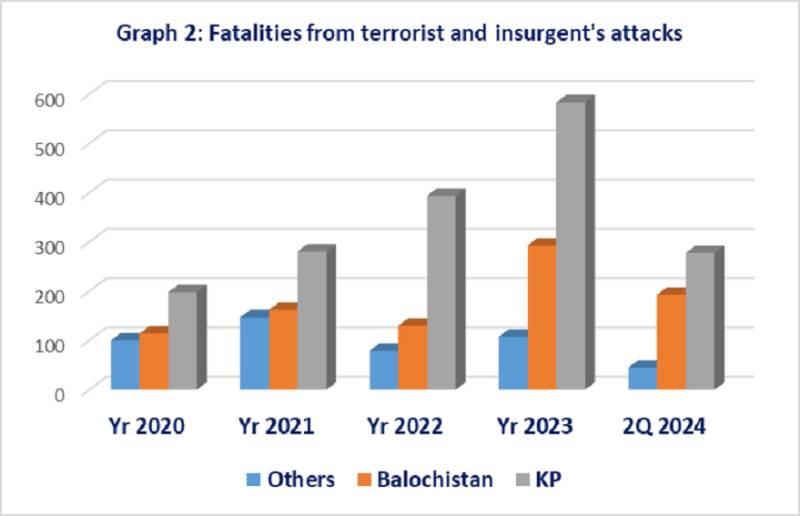
The extent to which militants, reportedly armed with 'ordinary rifles' according to PTI's Barrister Saif, have outmanoeuvred security operations in KP and Balochistan is evident in the graph below. Rather than enhancing the province's security system to counter these terror attacks more effectively, the PTI government and its leaders maintained contact with the TTP and advocated for dialogues with them.
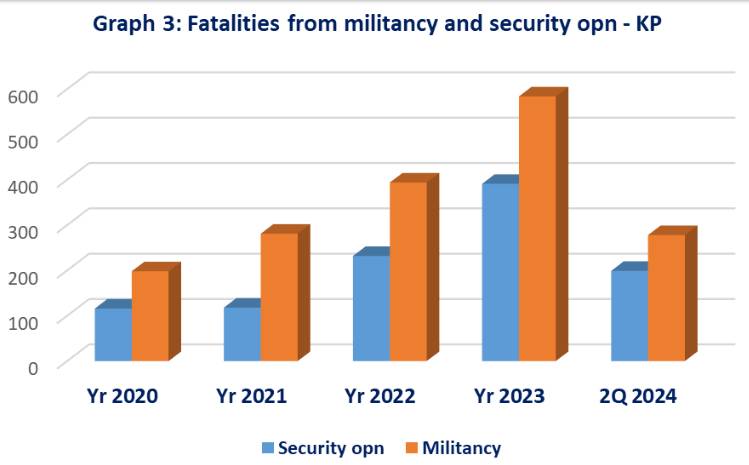
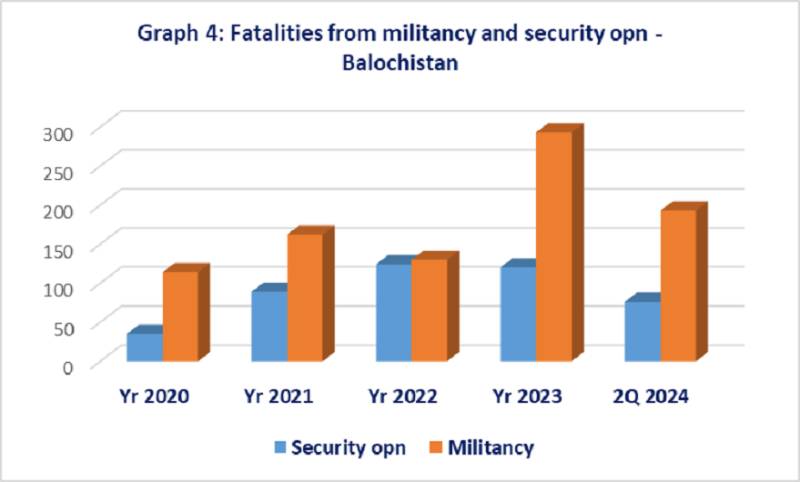
The statistically analysed data on militancy, as reflected in the above graphs, clearly show that the militants are far better armed than PTI's Barrister Saif previously believed. They possess sophisticated arms and ammunition supplied by the Afghan Taliban, who acquired these from US and NATO bases left behind during their withdrawal from Afghanistan. Pakistan has raised concerns about this situation on various international platforms.
A well-equipped militant force, with safe sanctuaries in a neighbouring country and supporters within Pakistan, is unlikely to miss such an opportunity to achieve its goals. Expecting to bring them to the negotiation table and agree to our terms is unrealistic. These militants are continually expanding their operational areas, setting up check posts to verify commuters' identities, and frequently intruding into Pakistani territories. Additionally, two TTP factions (the Gul Bahadur group and Jamaat-ul-Ahrar) have already announced their own operations (Al-Fatah and Al-Ra'ad) in response to the army's proposed Operation Azm-e-Istehkam to counter the growing militant threat.
If these analyses of the security situation fail to convince the political leadership of its gravity, we may have to brace for the repercussions of such policies. We can only hope that no adventurist akin to Hitler takes advantage of the confusing appeasement strategies currently employed by our leaders.

